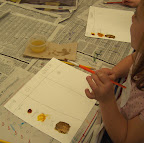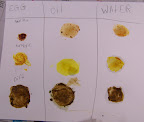Science activities in early childhood prepare for a lifetime of learning
By Peggy Ashbrook
Posted on 2009-03-30
Like learning to count or to read, learning how to do science is a process. Children of all ages benefit from exposure to “science” situations where they are encouraged to fully experience our world, describe what they see, count and record data, ask questions about the experience, repeat the experience, and think and talk about the why of it. If we want children to become life-long questioners and perform well on standardized tests when they are in high school, we need to include science in their early childhood curriculum where direct experience with different materials and an encouraging environment develop their beginning ideas about the natural world and their exploration confidence.
Science activities can be designed to encourage children to make predictions about what they think might happen. Questions such as “What do seeds need to sprout?” “What will happen to this object in water?” and “What is attracted to a magnet?” are common topics in preschool. After seeing what does happen, children can share their thoughts, informally or formally, and record them by drawing, writing, recording on a chart, and dictating. Once is usually not enough for engaging experiences, and repeating the process is part of scientific inquiry. Later that day, the next week or even months later, children will recall what they did and talk about why they think they saw the results that they did.
Today I saw a K-1 class mixing pinches of turmeric, paprika, and dirt into small dabs of egg yolk, oil, and water. (Safety note: Remind the children to keep hands and brushes out of their mouths and be sure to wash hands afterward.) They talked as they worked, noticing differences in all six materials and how the dry powders mixed into the liquids. The objective was to determine which mixture would be most suitable as paint.


(Click on the photos to enlarge.)
This structured investigation inspired a lot of discussion and wondering. I wonder at what levels the children will use this background to support future learning about differences between oil and water, the composition of foods, and how to preserve works of art.
Peggy
Disclaimer: The views expressed in this blog post are those of the author(s) and do not necessarily reflect the official position of the National Science Teaching Association (NSTA).


